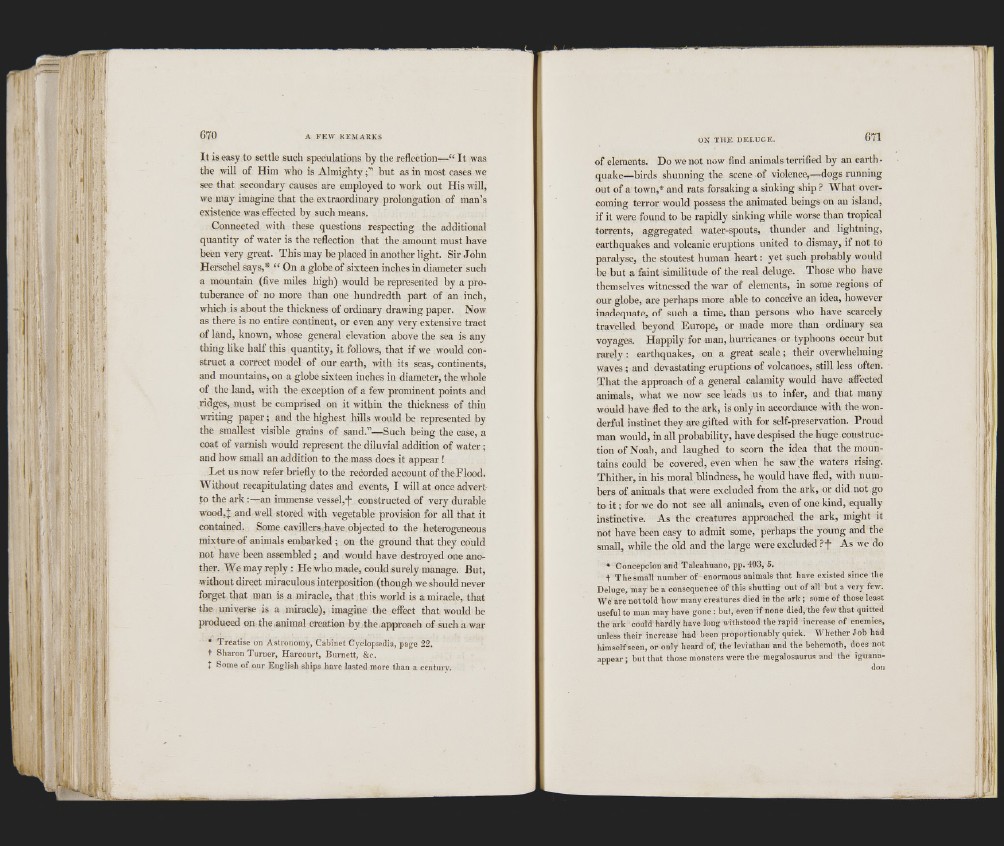
i ,
t !'
' i
'i;
pi
S
• il?
Y
U i
î
H i Y : l A
' t
î:
;■■■■ Mi'
U i U ft
i l i - i
JI
' ii r> t.
l i l
' I
ll
It is easy to settle such speculations hy the reflection—“ I t was
the will of Him who is Alm i g h t y h u t as in most cases we
see that secondary causes are employed to work out His will,
we may imagine that the extraordinary prolongation of man’s
existence was efiected hy such means.
Connected with these questions respecting the additional
quantity of water is the reflection that the amount must have
heen very great. This may he placed in another light. Sir John
Herschel says,* “ On a glohe of sixteen inches in diameter such
a mountain (five miles high) would he represented by a protuberance
of no more than one hundredth part of an inch,
which is about the thickness of ordinary drawing paper. Now
as there is no entire continent, or even any very extensive tract
of iand, known, whose general elevation above the sea is any
thing like half this quantity, it follows, that if we would construct
a correct model of our earth, with its seas, continents,
and mountains, on a globe sixteen inches in diameter, the whole
of the land, with the exception of a few prominent points and
ridges, must be comprised on it within the thickness of thin
writing paper; and the highest hills would be represented by
the smallest visible grains of sand.”—Such heing the case, a
coat of varnish would represent the diluvial addition of water;
and how small an addition to the mass does it appear !
Let us now refer briefly to the recorded account of theFlood.
Without recapitulating dates and events, I will at once advert
to the ark :—an immense vessel,# constructed of very durable
wood,] and well stored with vegetable provision for all that it
contained. Some cavillers have objected to the heterogeneous
mixture of animals embarked ; on the ground that they could
not have been assembled ; and would have destroyed one another.
We may reply : He who made, could surely manage. But,
without direct miraculous interposition (though we should never
forget that man is a miracle, that this world is a miracle, that
the universe is a miracle), imagine tbe effect that would be
produced on the animal creation by the approach of such a war
• Treatise on Astronomy, Cabinet Cyelopffidia, page 22.
+ Sharon Turner, Harcourt, Burnett, &c.
i Some of our English ships have lasted more than a century.
of elements. Do we not now find animals terrified hy an earthquake—
birds shunning the scene of violence,—dogs running
out of a town,* and rats forsaking a sinking ship ? What overcoming
terror would possess the animated beings on an island,
if it were found to he rapidly sinking while worse than tropical
torrents, aggregated water-spouts, thunder and lightning,
earthquakes and volcanic eruptions united to dismay, if not to
paralyse, the stoutest human heart : yet such probably would
he but a faint similitude of the real deluge. Those who have
themselves witnessed the war of elements, in some regions of
our globe, are perhaps more ahle to conceive an idea, however
inadequate, of such a time, than persons who have scarcely
travelled beyond Europe, or made more than ordinary sea
voyages. Happily for man, hurricanes or typhoons occur but
rarely : earthquakes, on a great scale ; their overwhelming
waves ; and devastating eruptions of volcanoes, still less often.
That the approach of a general calamity would have affected
animals, what we now see leads us to infer, and that many
would have fled to the ark, is only in accordance with the wonderful
instinct they are gifted with for self-preservation. Proud
man would, in all probability, have despised the huge construction
of Noah, and laughed to scorn the idea that the mountains
could he covered, even when he saw,the waters rising.
Thither, in his moral blindness, he would have fled, with numbers
of animals that were excluded from the ark, or did not go
to it ; for we do not see all animals, even of one kind, equally
instinctive. As the creatures approached the ark, might it
not have been easy to admit some, perhaps the young and the
small, while the old and the large were excluded ?# As we do
* Concepcion and Talcahuano, pp. 403, 5.
t The small number of enormous animals that have existed since the
Deluge, may be a consequence of this shutting out of all but a very few.
We are iiottold how many creatures died in the ark ; some of those least
useful to man may have gone : but, even if none died, the few that quitted
the ark could hardly have long withstood the rapid increase of enemies,
unless their increase had been proportionably quick. AVhether Job had
liimself seen, or only heard of, the leviathan and the behemoth, does not
appear ; but tliat those monsters were the megalosauriis and the iguanadon